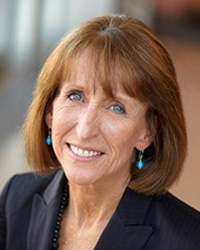A ‘Hail, Mary’ Pass? A Postgame Prayer
Professor Griffin questions how much SCOTUS values the Establishment Clause in high school football prayer decision

By Pat McDonnell
While it did not initially appear to have the intense gravity of the U.S. Supreme Court’s overturning Roe v. Wade on June 24, the ruling on Kennedy v. Bremerton School District three days later prompted William S. Boyd Professor of Law at UNLV Leslie Griffin to write as energetically as she ever has.
Griffin argues that the ruling in favor of public high school coach Joseph Kennedy’s right to pray with his football players after games in Washington state weakened the First Amendment’s Establishment Clause. Many law scholars have long weighed the clause and its instruction that Congress “shall make no law respecting an establishment of religion” as defining tenets in jurisprudence on the separation of church and state.
“This has been a trend,” says Griffin, who has taught at the Boyd Law for 10 years. “The older [Supreme] Court said, ‘No, we can’t support religion.’ The government is supposed to set up a system for everyone—even the atheists and the nonbelievers. The newer Court has weakened the Establishment Clause and put more religion in government.” They allowed a public school’s football coach to lead his players in public Christian prayer.
Connecticut native Griffin is teaching Constitutional Law II and Bioethics this semester as well as Law and Religion in Spring 2023. In August, Foundation Press published the fifth edition of her law and religion casebook, written with constitutional attorney Andrew Seidel.
“I have always studied ethics and became fascinated with the courts because it seemed to me they were saying a lot about our ethical questions,” Griffin says. “So I went to law school [in 1989] to find out why that was happening, and have stayed interested in how the courts treat ethical questions, especially religious ethical ones.”
The former theology professor at the University of Notre Dame and Saint Joseph’s University says the future of the Supreme Court and its rulings rest in the hands of voters. She feels that some who cast their vote don’t fully understand how the executive and legislative branches of government can induce seismic movement on the nation’s highest court.
“If you care about the courts, pay attention to your votes for president and Senate,” Griffin says.
When she has time away from academia and the law, Griffin enjoys following a New York team that is not famous for its navy blue and white pinstripes.
“I’m a huge baseball fan, and I love the Mets. I wore my Mets cap to class,” she says. “I have several students, too, who are Dodgers fans, and even one who worked for the Braves.”